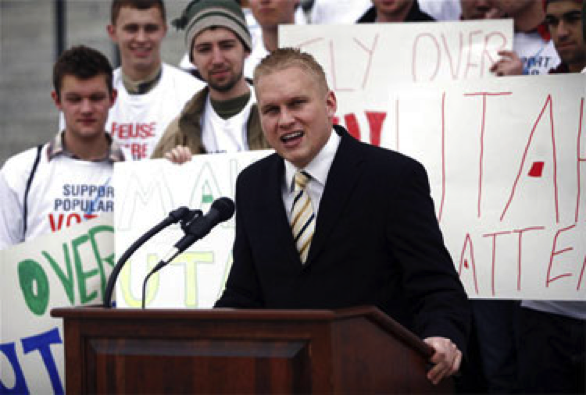- Ask your Utah state legislators to pass the National Popular Vote bill
- Send a letter-to-editor to Utah newspaper
- Utah National Popular Vote group's web site
In January 2021, Utah Senator Derek L. Kitchen introduced the National Popular Vote bill in the Utah Senate (status of SB121)
In January 2018, Representative Jeremy A. Peterson introduced the National Popular Vote bill (HB 193).
On November 15, 2017, the Government Operations Interim Committee held a hearing on the National Popular Vote bill. Letter and Op-Ed in Salt Lake Tribune, and Op-Ed in St. George Spectrum.
On February 10, 2012, Utah state Senator Howard Stephenson introduced the National Popular Vote bill (SB-63) in the Utah Senate, and Representative Kraig Powell introduced the bill (HB 509) in the House of Representatives.

On October 3, 2011, former Utah U.S. Senator Robert Bennett wrote op-ed in Deseret News pointing out:
"[The National Popular Vote approach] would change the nature of campaigns in a very fundamental way. Utah, instead of being a 'flyover' state, ignored by both parties because the electoral vote outcome is well known in advance, would see more attention being paid to it as additional votes in Utah would be as important in the national total as additional votes in Ohio or Pennsylvania — 'battleground' states on the Electoral College map. In the last election, turnout in battleground states was 7 percent higher than in flyover states. Utah, which once led the nation in voter turnout, is now one of the lowest; knowing that one's vote really counted could turn that trend around."
On February 24, 2011, Senator Stephen H. Urquhart introduced the National Popular Vote bill [SB 252] in the Utah Senate. Former U.S. Senator Jack Garn wrote letters of support to the Senate President and the committee studying the issue.
- Letter from former U.S. Senator Jake Garn to State Senate President Waddoups
- Letter from former U.S. Senator Jake Garn State Senate committee
On February 2, 2011, Representative Neil A. Hansen introduced the National Popular Vote bill (HB 297) for the 2010 legislative session.
A survey of 800 Utah voters conducted on May 19-20, 2009 showed 70% overall support for the idea that the President of the United States should be the candidate who receives the most popular votes in all 50 states. Voters were asked:
"How do you think we should elect the President: Should it be the candidate who gets the most votes in all 50 states, or the current Electoral College system?"
Then, voters asked a second question that emphasized that Utah's electoral votes would be awarded to the winner of the national popular vote in all 50 states, not Utah, vote. In this second question, 66% of Utah voters favored a national popular vote.
"Do you think it more important that a state's electoral votes be cast for the presidential candidate who receives the most popular votes in that state, or is it more important to guarantee that the candidate who receives the most popular votes in all 50 states becomes president?"
The results of the first question, by political affiliation, was 82% among Democrats, 66% among Republicans, and 75% among others. By gender, support was 78% among women and 60% among men. By age, support was 70% among 18-29 year olds, 70% among 30-45 year olds, 70% among 46-65 year olds, and 68% for those older than 65.
The results of the second question, by political affiliation, was 77% among Democrats, 63% among Republicans, and 62% among others. By gender, support was 72% among women and 58% among men. By age, support was 61% among 18-29 year olds, 64% among 30-45 year olds, 68% among 46-65 year olds, and 66% for those older than 65. May 2009 Utah poll
On January 27, 2007, Utah State Representative Neil A. Hansen introduced the National Popular Vote bill (HB 346) (Status of HB 346) into Utah Legislature for the 2007 session.
A KSL Radio web poll reports that 59% of 928 persons favor nationwide popular election of the President. poll
In 1966, Delaware Attorney General David P. Buckson filed a lawsuit on behalf of the state of Delaware against New York (and other states) concerning the use of the winner-take-all rule in presidential elections. Under the winner-take-all rule (also called the "unit rule" or "general ticket" system), all of a state's electoral votes are awarded to the candidate who receives the most popular votes in each separate state. In 1966, Delaware led a group of 12 predominantly low-population states (including North Dakota, South Dakota, Wyoming, Utah, Arkansas, Kansas, Oklahoma, Iowa, Kentucky, Florida, Pennsylvania) in suing New York in the U.S. Supreme Court. In State of Delaware v. State of New York, the plaintiff states argued that New York's use of the winner-take-all rule effectively disenfranchised voters in their states. The Supreme Court declined to hear the case (presumably because of the well-established constitutional provision that the manner of awarding electoral votes is exclusively a state decision). Ironically, the defendant (New York) is no longer an influential closely divided battleground state (as it was in the 1960s). Today, New York suffers the very same disenfranchisement as most of the less populous states because it too has become politically non-competitive. Today, a vote in New York is equal to a vote in Delaware or Utah: votes in both are equally irrelevant in presidential elections.